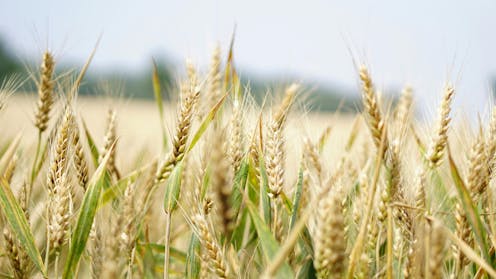Australian farmland values are at lofty heights. Research reveals this could be hurting some farmers
- Written by Amir Arjomandi, Associate Professor of Economics, School of Business, University of Wollongong

Over recent decades, farmland values in Australia have soared. Nationally, the price of broadacre farmland[1] – used for cropping or sheep and beef grazing – has increased by more than eightfold[2] since 1992.
It might seem like this could only be good news for those who own and operate farms. But this boom carries surprising downsides for the profitability of the farming industry.
Our new study[3] examined the dynamic relationship between farmland prices and the profitability of Australia’s farming sector. To do this, we used national and state-level data from 1992 to 2022.
We found when farm profits rise, farmland prices tend to increase as well, with a lag of two to five years. But there’s a catch: higher land values push up production costs, which can erode profits over time.
This feedback loop – where higher profits lifts farmland prices but those higher prices eventually squeeze profitability – has some serious implications for farm business viability.
What’s driven farmland’s surge?
Several factors have contributed to the rapid growth in Australia’s farmland prices in recent years. These include strong commodity prices and good seasonal conditions[4], periods of low interest rates[5] and increased demand[6] for land.
While some of these forces have rewarded existing landholders, they have also increased barriers to entry[7] for younger or less wealthy farmers to enter the industry.
LocalAg is a leading Australian marketplace, made by farmers for farmers
This isn’t just an Australian phenomenon. Between 2002 and 2023, global farmland values grew at an average annual rate of 10%[8].
Analysts argue[9] the major drivers of this surge include “growing concerns about food and land scarcity” and the increasing practice of valuing farmland for its environmental benefits[10], such as carbon storage, water rights, or biodiversity credits. They also note its appeal as a desirable investment, offering stable long-term returns with relatively low risk.
High land values can make it hard to farm
Rising land values can create a complex situation. For one, they mean farmers need more fund to buy new land or to improve existing operations, particularly those looking to expand[11] or who are newcomers to the industry[12].
Farm expansion is important for farmers, because farm size has proven a key factor driving productivity gains.
Many Australian broadacre farms have benefited from what are called “economies of scale[13]”. By spreading fixed costs such as machinery and management expenses over larger operations, they’re able to lower their average costs and gain a competitive advantage.
Other hurdles
Rising land prices also raise costs in less obvious ways. In recent years, a significant proportion of farmers have grown to rely on leasing additional land to run their operations.
A 2020 report[15] from Rabobank found 45% of farmers in South Australia and 38% in Western Australia lease a portion of the land they operate.
But leasing rates tend to rise in line with land values[16], which in turn erodes the profitability of those who lease land for farms for farming operations.
The rise in farmland values may also lead to significant borrowing costs[17] for new farmers and existing farmers expanding their businesses if they finance their farmland purchases with debt.
This is because higher property prices require larger loans, which lead to higher interest repayments and ultimately diminish profitability.
For those who do own land outright, there is a potential upside. Higher land prices boost farmer wealth and equity levels. This increases borrowing capacity and supports productivity growth by making it easier for farmers to access capital for further investments[18], such as upgrading machinery or adopting new technology.
But even for this group, rising land values can inflate property taxes[19] and insurance premiums, eroding profits.
Headed for the exit
This trend has real consequences for farmers and rural communities.
When farmland prices rise sharply, many long-time farmers see an opportunity to sell up and leave the industry. But when they go, their years of knowledge about how to run farms efficiently and productively go with them, leaving a gap that’s hard to replace.
High land prices also push some farmers, especially younger ones, out of the market altogether. In parts of Australia, it’s becoming harder to afford land to buy or lease, which threatens their ability to make a decent living from farming.
If fewer people can make a living on the land, that puts pressure on Australia’s food supply. It also affects the towns and communities built around farming. Fewer farmers mean fewer families in the region, which can lead to schools and local businesses closing and a weakening of the community fabric.
At the same time, when farmland becomes very expensive, there’s more pressure to squeeze every dollar out of it. That can encourage farming practices that put short-term profit ahead of long-term environmental care.
Policymakers, farmers and the public can’t afford to ignore these hidden costs.
The authors would like to acknowledge the contributions of Florian Gerth, who co-authored the research discussed in this article.
References
- ^ broadacre farmland (www.agriculture.gov.au)
- ^ more than eightfold (www.agriculture.gov.au)
- ^ new study (doi.org)
- ^ good seasonal conditions (www.theguardian.com)
- ^ low interest rates (www.abc.net.au)
- ^ demand (www.agriculture.gov.au)
- ^ increased barriers to entry (www.agriculture.gov.au)
- ^ average annual rate of 10% (www.savills.com.au)
- ^ argue (www.savills.com.au)
- ^ valuing farmland for its environmental benefits (pre-sustainability.com)
- ^ those looking to expand (www.agriculture.gov.au)
- ^ newcomers to the industry (ageconsearch.umn.edu)
- ^ economies of scale (www.agriculture.gov.au)
- ^ Lukas Coch/AAP (photos.aap.com.au)
- ^ report (www.rabobank.com.au)
- ^ rise in line with land values (www.youngfarmer.nsw.gov.au)
- ^ significant borrowing costs (daff.ent.sirsidynix.net.au)
- ^ further investments (www.agriculture.gov.au)
- ^ inflate property taxes (www.revenue.nsw.gov.au)
Authors: Amir Arjomandi, Associate Professor of Economics, School of Business, University of Wollongong







